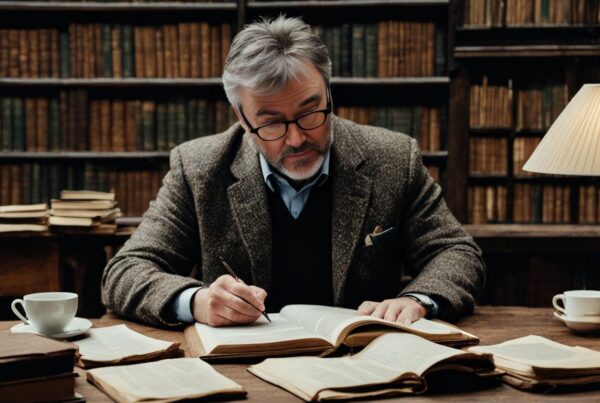Are you in search of an inspiring and thought-provoking audiobook? Look no further than “Three Cups of Tea” by Greg Mortenson and David Oliver Relin. This audiobook review examines the story of one man’s mission to promote peace and education in Asia, one school at a time.
The audiobook presents an engaging narrative that explores the importance of education and cultural understanding in fostering peace and unity. With vivid storytelling and rich descriptions of the cultural context, “Three Cups of Tea” takes the listener on a journey through the challenges and triumphs of promoting an educational mission in Asia.
Key Takeaways:
- “Three Cups of Tea” is an audiobook that emphasizes the importance of education and cultural understanding in promoting peace.
- It offers a vivid and inspiring narrative that takes listeners on a journey of one man’s mission to promote education in Asia.
- A focus on character development and cultural context allows listeners to gain a deeper understanding of the challenges and triumphs of promoting education in the region.
- The audiobook experience is enhanced by the narrators’ performances and production quality.
- Overall, “Three Cups of Tea” is a must-listen for anyone interested in promoting peace and education in today’s world.
Overview of “Three Cups of Tea”
“Three Cups of Tea” by Greg Mortenson and David Oliver Relin is a poignant memoir that documents Mortenson’s journey of building schools in remote areas of Pakistan and Afghanistan. The book sheds light on Mortenson’s one man’s mission to promote peace and education, one school at a time.
The book’s central theme revolves around the idea that education is the key to peace. Mortenson, the protagonist, understands the importance of education and is dedicated to providing it to the children in the region. Through his journey, readers are exposed to the harsh realities of life in Pakistan and Afghanistan, including poverty, war, and the struggle for survival.
The book’s primary setting is Pakistan and Afghanistan, where Mortenson travels extensively in his quest to build schools. Throughout the book, he encounters many challenges, including cultural barriers and threats to his own safety. However, his unwavering determination and passion keep him going despite the odds.
Overall, “Three Cups of Tea” is an insightful and inspiring book that highlights the transformative power of education. It is a must-read for anyone interested in issues related to education, peace, and social justice.
Author Background
Greg Mortenson and David Oliver Relin co-authored the book “Three Cups of Tea”. Mortenson is a philanthropist and mountaineer who has dedicated his life to building schools in impoverished regions of Pakistan, Afghanistan, and Tajikistan. He has received numerous awards, including the Sitara-e-Pakistan (Star of Pakistan), Pakistan’s highest civil award. Relin was an American writer and journalist who had written for prominent publications like The New York Times and Parade magazine. He has authored several books, including “Second Suns: Two Trailblazing Doctors and Their Quest to Cure Blindness, One Pair of Eyes at a Time”. Mortenson passed away in 2021, but his legacy of promoting education in underprivileged regions continues to inspire many.
Plot Summary
The audiobook “Three Cups of Tea” follows the real-life story of Greg Mortenson, a mountaineer who became lost in Pakistan and was rescued by a poor local village. Mortenson made a promise to the village elders to build them a school and inadvertently began his mission to promote peace and education in Pakistan and Afghanistan.
As Mortenson overcomes numerous obstacles and setbacks, he faces language barriers and cultural differences, but eventually the village embraces him and recognizes his sincerity. Mortenson’s educational mission in Asia takes shape, as he transforms from a lost mountaineer to a philanthropic education activist.
Mortenson partners with guide-turned-co-author David Oliver Relin. They established “The Central Asia Institute,” which raised funds and built schools in one of the world’s most remote regions. Mortenson’s philosophy was that if we stop fighting the war on terror and start to educate the innocent children of Pakistan and Afghanistan, the world will be a more peaceful place.
The story of “Three Cups of Tea” is a heartwarming and compelling account of the unbreakable human spirit and the ability to effect meaningful change in the world. It is an inspiring tale of hope, generosity, and the power of one.

Themes Explored
Throughout “Three Cups of Tea,” several themes are explored that shed light on the book’s educational mission in Asia. One key theme is the importance of education for girls in areas that have historically undervalued their potential. Greg Mortenson recognizes that providing access to education can help lift communities out of poverty and promote peace.
Another theme is cultural understanding, as Mortenson works to bridge the gap between Western culture and the communities he serves. This involves learning about local customs and beliefs, as well as sharing his own experiences and values.
Resilience is also a key theme, as Mortenson faces numerous challenges along the way, including illness, funding shortages, and cultural misunderstandings. Despite these obstacles, he persists in his mission to build schools and promote education.
Finally, “Three Cups of Tea” emphasizes the power of one person to make a difference. Mortenson’s determination and passion inspire others to join his efforts, creating a ripple effect of positive change that extends far beyond his individual contributions.
Writing Style and Narration
One of the key features of an audiobook is the narrator’s ability to convey the author’s words with clarity and precision. In the case of “Three Cups of Tea,” the narration is top-notch, with the narrators delivering a compelling and engaging performance that keeps the listener engrossed throughout.
The writing style of Greg Mortenson and David Oliver Relin is both descriptive and emotive. The authors use vivid imagery to bring the story to life, allowing the listener to visualize the breathtaking landscapes and complex cultural nuances of the regions Mortenson travels through. The result is a gripping narrative that is both thought-provoking and inspiring.
The audiobook’s structure and pace are also well-balanced. The narrators use pausing and emphasis to create a natural rhythm that complements the story’s ebb and flow. This makes for a seamless listening experience that enhances the story’s impact.
Descriptive Language
The authors’ use of descriptive language is a standout feature of the audiobook. The vivid descriptions of the landscape, culture, and people of Pakistan and Afghanistan transport the listener and create a sense of immersion in the story’s world.
Impact on the Listener
The audiobook’s writing style and narration work together seamlessly to create a moving and impactful listening experience. The listener is drawn into the story and invested in Mortenson’s journey, making the book’s messages of education, cultural understanding, and peace all the more resonant.
Character Analysis
“Three Cups of Tea” features a cast of characters who play a crucial role in advancing Greg Mortenson’s educational mission in Asia. In this section, we’ll take a closer look at the main characters and their impact on the story’s central message.
Greg Mortenson
As the central figure of the story, Greg Mortenson is a humanitarian and mountaineer who becomes committed to building schools in some of the most remote and impoverished areas of Pakistan and Afghanistan. Mortenson’s passion for education and cultural understanding drives him to establish the Central Asia Institute, which becomes instrumental in funding the construction of dozens of schools in the region. Through Mortenson’s grit, dedication, and perseverance, “Three Cups of Tea” presents an inspiring story of one person’s ability to make a real difference.
Haji Ali
A local Pakistani village chief, Haji Ali, is instrumental in helping Mortenson understand the customs and traditions of the people he seeks to help. Ali becomes a close friend and ally to Mortenson, helping him navigate the political and cultural landscape of the region. Without Ali’s assistance, Mortenson would not have been able to achieve his ambitious goals, and the construction of countless schools would not have been possible.
Tara Bishop
Tara Bishop is one of the earliest supporters of Mortenson’s mission, and she helps him establish the Central Asia Institute. A skilled fundraiser, Bishop is critical in obtaining the financial support necessary to construct and maintain the schools. Additionally, her friendship with Mortenson is an essential element in his personal and professional success.
Dr. Jean Hoerni
The book’s other primary supporter is Dr. Jean Hoerni, a successful electronics entrepreneur who provides significant financial resources to fund Mortenson’s mission. In addition, he becomes a guiding mentor and friend to Mortenson, offering valuable advice and assistance whenever it is needed.
Cultural Context
To fully appreciate the narrative of “Three Cups of Tea,” it is crucial to examine the cultural context surrounding the book. Written by Greg Mortenson and David Oliver Relin, the book tells the story of Mortenson’s mission to promote peace and education by building schools in remote regions of Pakistan and Afghanistan.
In the aftermath of the September 11 attacks, Mortenson became determined to make a positive difference in the lives of the people living in the region. His work was shaped by the complex political and social dynamics of the area, including the ongoing conflict in Afghanistan, the role of the Taliban, and the influence of neighboring countries such as India and Iran.
Furthermore, Mortenson’s efforts to build schools were not without obstacles. He faced opposition from conservative elements within the local communities who saw his educational mission as a threat to their traditional way of life. Additionally, he had to navigate the often-complicated relationships between the different ethnic and religious groups living in the region.
Overall, the cultural context of “Three Cups of Tea” provides valuable insights into the challenges and complexities of promoting education and peace in a region that has been marred by conflict and instability for decades.
Impact and Reception
Since its release in 2006, “Three Cups of Tea” has had a significant impact on readers and critics alike. The book’s message of peace and education has resonated with many, inspiring them to take action in their own lives.
However, “Three Cups of Tea” has not been without controversy. In 2011, CBS’ “60 Minutes” aired a report questioning the accuracy of Greg Mortenson’s account in the book. The report alleged that Mortenson had fabricated key elements of his story, including his kidnapping by the Taliban and his encounter with villagers in the remote region of Korphe. These allegations were later confirmed by a thorough investigation by author Jon Krakauer, who co-authored a book about Mortenson titled “Three Cups of Deceit.”
| Positive Reception | Negative Reception |
|---|---|
| Named a New York Times bestseller and stayed on the list for over four years. | Received backlash for inaccuracies in Mortenson’s account. |
| Commended by many for its inspiring message of promoting peace and education in underserved areas. | Criticized for misrepresenting the cultural and social context of Pakistan. |
| Praised for its engaging storytelling and vivid descriptions of the Pakistani wilderness. | Cast doubt on the effectiveness of Mortenson’s non-profit, Central Asia Institute. |
Regardless of the controversy surrounding the book, “Three Cups of Tea” continues to be a popular and influential work, inspiring readers to take action and make a difference in the world.
Audiobook Experience
“Three Cups of Tea” is an engaging and educational audiobook. The narrators’ performances are excellent, bringing the story to life and captivating listeners. Their voices are clear, easy to understand, and capture the emotions of the different characters portrayed in the book.
The production quality of the audiobook is superb, with precise editing, balancing, and mastering. The sound effects and background music offer a rich audio experience and enhance the overall listening experience.
The audiobook also features additional elements that make it more engaging, such as author interviews, discussions with experts, and insights into the making of the book. These features provide valuable context and enhance the reading experience.
Overall, listening to “Three Cups of Tea” on audiobook is an excellent way to experience this inspiring and important story.
Comparison to the Print Version
For those who prefer physical copies of books, it’s worth comparing the audiobook version of “Three Cups of Tea” to the print version. One of the obvious differences is the format – while the audiobook is an auditory experience, the print version is a visual one. This means that the print version allows readers to pause and reflect on specific passages and reread certain parts if needed.
However, the audiobook offers a unique and immersive experience that brings the story to life with the help of skilled narrators’ performances. The audiobook also allows listeners to multitask and consume the book while doing other activities. It’s worth noting that audiobooks often have additional features, such as interviews with the author or bonus content that might not be available in the print version.
| Comparison factor | Audiobook | Print Version |
|---|---|---|
| Format | Audio | Physical book |
| Reading experience | Immersive and convenient for multitasking | Allows for reflection and rereading |
| Additions | Possible additional features, such as bonus content or author interviews | None |
Ultimately, the decision between the two formats comes down to personal preference. Fans of audiobooks and those who prefer the convenience of listening to a novel should opt for the audiobook version, while readers who prefer the ability to pause and reflect on the story should choose the print version.
Conclusion
Overall, “Three Cups of Tea” is an inspiring and thought-provoking audiobook that explores the power of education and cultural understanding in promoting peace. Greg Mortenson and David Oliver Relin’s writing brings the story to life, taking the listener on a journey through the breathtaking landscapes and diverse cultures of Pakistan and Afghanistan.
The audiobook’s themes of resilience and the ability of one person to make a difference are particularly relevant in today’s world. Listeners will be left with a sense of hope and a renewed appreciation for the value of education and cross-cultural communication.
While the audiobook experience may not be for everyone, it offers a unique and engaging way to experience the story. The narrators’ performances and production quality are top-notch, immersing the listener in the world of the book.
For those who prefer the print version, “Three Cups of Tea” is also a compelling read that delivers the same powerful message. Regardless of the format chosen, this audiobook is a must-listen for anyone interested in promoting peace and education in our world.



